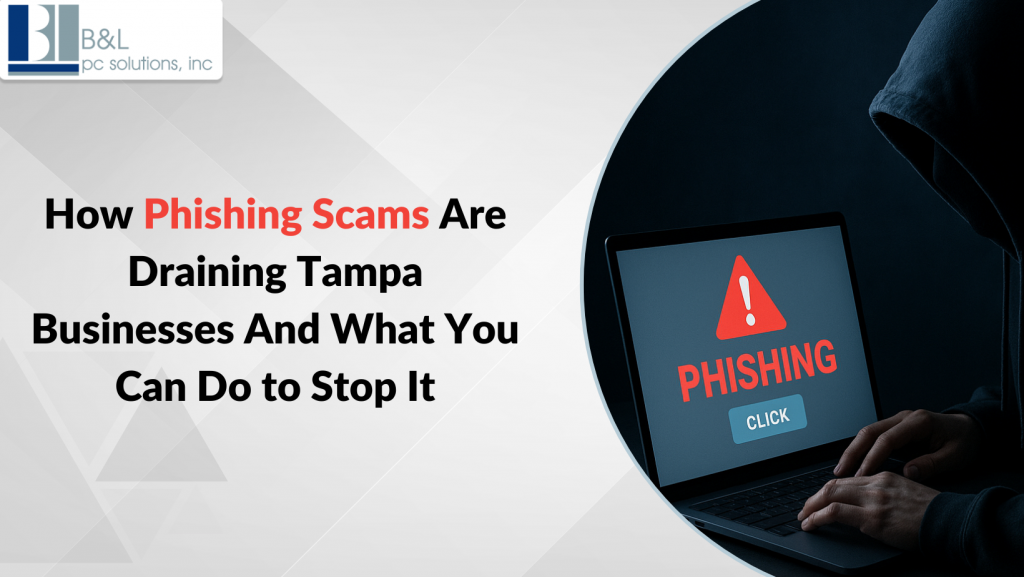
Business email compromise (BEC) attacks are a major problem for Tampa and global businesses. Florida ranked among the top five states for reported cybercrime losses, with Tampa alone seeing a sharp rise in business email compromise cases targeting healthcare, real estate, and local government sectors. According to the FBI’s IC3 data, Floridian victims reported tens of millions in BEC-related losses, underscoring the growing threat to regional businesses and institutions.
The Real Cost of That ‘One Click’
While business owners worry about hurricanes and rising insurance costs, a silent predator is systematically destroying Florida companies. Phishing attacks now cost businesses in Tampa, FL, billions annually.
Here's what most Tampa business owners don't realize: when a phishing attack succeeds, they are not just losing money. They also face legal fees, regulatory fines, lost productivity, damaged reputation, and potentially years of rebuilding customer trust.
At B&L PC Solutions, we have watched established businesses that survived many generations close their doors permanently after a single successful phishing attack.
Is Your Business a Sitting Duck?
Most Tampa companies operate under dangerous assumptions that they are too Local to be targeted. However, cybercriminals go after all types and sizes of businesses. Some businesses don’t prioritize dedicated IT teams. Hence, they have weaker protection systems.
Your business likely faces these vulnerabilities right now:
- Employees checking personal email on work computers
- Password reuse across multiple business accounts
- Outdated software with unpatched security holes
- No formal training on recognizing suspicious communications
- Remote workers connecting from unsecured home networks
The Six Attack Methods Destroying Tampa Businesses
1. CEO Fraud (Business Email Compromise)
Your office manager receives an urgent email, supposedly from ‘you’, requesting an immediate wire transfer for a confidential acquisition. The email looks perfect, complete with a correct signature, a familiar tone, and even references to recent company events. Except you never sent it.
This modus operandi attack has helped cybercriminals succeed than other phishing methods. The key reason is that it uses authority and urgency. Attackers do not merely pick targets at random. They spend time researching and studying social media, press releases, and employee LinkedIn profiles. They then create cunning strategies and craft convincing situations.
2. Vendor Invoice Scams
Cybercriminals know how to get into your inbox and intercept email conversations between your company and regular vendors. They insert themselves into conversations, bringing up pending invoices and subtly changing payment instructions so that funds are directed to their own accounts. As the conversation appears to continue naturally, finance teams rarely question the new banking details.
3. Payroll Diversion Attacks
An employee receives an email appearing to come from HR, requesting updated direct deposit information for ‘new banking requirements.’ The employee dutifully provides new account numbers, unknowingly redirecting their next several paychecks to criminals. This attack often goes unnoticed for weeks until the employee questions missing pay.
4. Fake Legal Threats
Your business receives an official-looking notice claiming copyright violation, unpaid taxes, or a pending lawsuit. The document asks you to pay immediately or demands that you share confidential information to close the case. The attackers are aware of the legal concerns of some business owners and put pressure on them to take immediate action. Most owners, fearing legal implications, follow the instructions without proper verification.
5. Supply Chain Compromises
Criminals hack your trusted vendors' email systems, then send malicious emails to all the vendors' clients, including your business. Since the emails originate from legitimate, recognized email addresses, they bypass most security filters and appear completely trustworthy to the recipients.
6. Social Engineering via Phone
An attacker calls your office claiming to be from your IT support company, bank, or software vendor. They cite a security incident requiring immediate verification of login credentials or financial information. The caller sounds professional, uses technical terminology, and creates an artificial sense of urgency to pressure compliance.
The Warning Signs Your Team Might Miss
Most employees lack the training to identify phishing attacks from genuine messages; hence, they are not prepared to search for these markers. They only look out for typical red flags like suspicious email addresses or inadequate usage of grammatical rules. Modern phishing attacks are designed by experts who know how to use psychological techniques to mislead others.
Watch for these clues:
- Unexpected urgency in routine communications
- Requests for information that the person should already have
- Slight variations in familiar email domains
- Communications that bypass normal approval processes
- Pressure to act before consulting others
Improving Your Plans for Defense
You must do more than get antivirus software and hope for the best to safeguard your Tampa company. You need tiered defenses that consider human psychology, technical vulnerabilities, and changing attack strategies.
Employee Training
Generic cybersecurity awareness videos won't protect your business. Your team needs hands-on training with simulated phishing attacks that mirror the specific threats targeting your industry. We create custom training scenarios based on attacks we've seen targeting similar Tampa businesses, then track which employees need additional coaching.
Phishing is emerging as a critical threat to Tampa City companies that have vital infrastructure.
B&L PC Solutions provides customized phishing and cybersecurity awareness training. The process replicates actual phishing attacks and evaluates your team's readiness. Our training safeguards the most valuable assets of your business in this constantly changing environment.
Our tested and proven cybersecurity processes help us train and update your professionals. We also show them how to utilise cutting-edge tools and technologies to identify threats and implement preventive measures.
Technical Controls
Email filters often identify simple threats. The more advanced ones can only be caught using powerful technologies designed for the purpose. Account hacking can be prevented through multifactor authentication, even when the passwords are compromised. Make security checks more frequent.
Planning for Incident Response
When an attack succeeds, your response in the first thirty minutes determines whether you face a minor inconvenience or a business-ending crisis. Having a tested incident response plan can literally save your company.
Why Tampa Businesses Choose B&L PC Solutions
At B&L PC Solutions, we don't just talk about cybersecurity; we experience it every day. While other IT companies focus on fixing problems after they occur, we specialize in preventing the problems that could destroy your business. We offer our services in St. Petersburg, Florida.
We have a deeper understanding of local business problems, and our solutions are strategically designed to resolve them effectively. We know the specific threats targeting local industries, the compliance requirements affecting different business types, and the practical challenges of implementing security measures in resource-constrained environments.
When you choose us, you get:
- Custom security assessments based on your specific business risks
- Employee training programs that actually change behavior
- 24/7 monitoring and response capabilities
- Cybersecurity expertise who understand your business
- Proven incident response procedures that minimize damage
Our services also include dark web monitoring, email encryption, network security, and ransomware protection,
The Price of Waiting
Every day you delay installing adequate cybersecurity protections is another day crooks may investigate your company, spot flaws, and design their raid. The average time from first breach to detection is a few months, which means attackers might be inside your systems right now, unobtrusively amassing data for a major theft.
The issue is not whether your business will become a victim. It's whether you will be ready when it happens.
Take Action Today
Stop hoping cybercriminals will target someone else's business. Start protecting the company you have worked so hard to build.
We will identify your specific weaknesses and risk level and create a strategic plan to safeguard your company, personnel, and clients.
Avoid being another cautionary tale. Call us.
Frequently Asked Questions
How frequently should the employees be made aware of phishing?
Monthly simulated phishing tests complement quarterly training programs best. With this frequency, awareness is maintained without overloading staff members with repetitive information.
Can local Companies in St. Petersburg afford enterprise-level cybersecurity?
Modern security technologies grow to match grassroots business budgets while still delivering strong protection. Prevention always costs less than recovery.
If we believe an employee clicked a harmful link, what should we do?
Change all potentially compromised passwords, contact your cybersecurity company, and immediately separate the affected computer from your network. Immediate action can halt the danger from infiltrating your systems.
Is there a way of identifying the legitimacy of an email?
If you find the email to be suspicious, never click on any links. To independently verify the request, call the alleged sender utilizing phone numbers from your records or their official website.
What's the worst mistake Tampa firms often make in the area of cybersecurity?
Grassroots Companies believe that they are either too irrelevant to be the focus of attention. Cybercriminals target local businesses in particular, as they often have weaker security, yet handle significant information and money.
Tags: CyberDefense, PhishingPrevention, TampaBusinessSecurity





